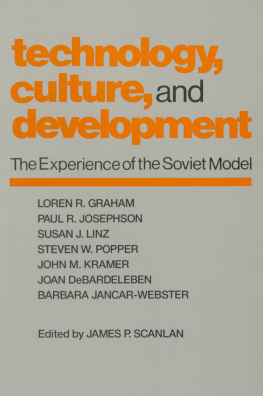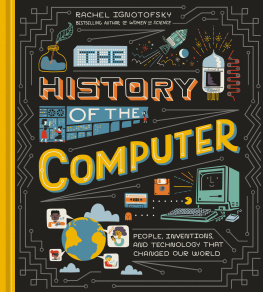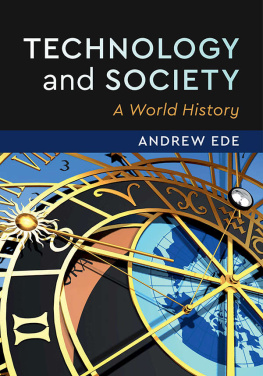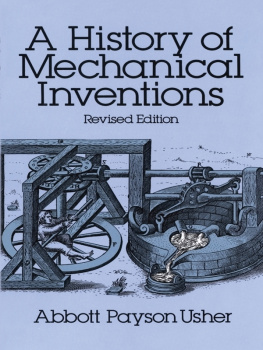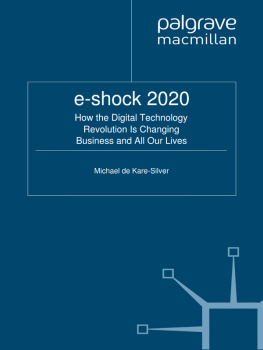THE SHOCK OF THE OLD
Offers a view of technology that matters in a world convinced that it is discovering everything for the first time Guardian
Alan Bennetts history boys have a keen rival in audacious revisionism in David Edgertons latest book. Where the young historians delighted in proclaiming that Stalin was a sweetie and Wilfred Owen was a wuss, Edgerton focuses on unquestioned assumptions about the history of technology. TLS
A quiet pleasure and salutary corrective Edgerton leaves us with an infinitely more nuanced, balanced and perceptive account of technology and social change than conventional accounts would allow. David Goldblatt, Independent
The Shock of the Old is a book I can use. I can take it in two hands and bash it over the heads of every techno-nerd, computer geek and neophiliac futurologist I meet. Simon Jenkins
I liked Edgertons challenging thesis, and I want to cheer it on in the face of our throw-away world of non-stop neophilia John Cornwell, Sunday Times
Edgertons innovation is to focus on the technologies we actually use rather than Tomorrows World-style bright new things that mostly never catch on or last. Peter Forbes, Daily Mail
Original and timely a compelling tour de forceNature
A pathbreaking work American Scientist
Newfangled things are sexy, but how significant are they? Edgerton provides a corrective by emphasising some of the overlooked technologies that affect the lives of many John Sparks, Newsweek
Packed with iconoclastic, thought-provoking ideas that challenge our innovation-centric view of technology. Icon
Lucid and completely convincing points are made without a trace of romanticism, which only adds to the power of his argument. [The] optimistic political message is merely one of this splendid books strengths. Journal of American History
DAVID EDGERTON is the Hans Rausing Professor at Imperial College London, where he was the founding director of the Centre for the History of Science, Technology and Medicine. He has challenged conventional analyses of technology for twenty years, and is a regular in the press, on television and radio. He is married with three children and lives in London.
THE SHOCK OF THE OLD
Technology and global history since 1900
DAVID EDGERTON

This paperback edition published in 2008
First published in Great Britain in 2006 by
PROFILE BOOKS LTD
3A Exmouth House
Pine Street
Exmouth Market
London EC1R 0JH
www.profilebooks.com
Copyright David Edgerton, 2006, 2008
1 3 5 7 9 10 8 6 4 2
Typeset in Minion by MacGuru Ltd
info@macguru.org.uk
Printed and bound in Great Britain by
Bookmarque, Croydon, Surrey
The moral right of the author has been asserted.
All rights reserved. Without limiting the rights under copyright reserved above, no part of this publication may be reproduced, stored or introduced into a retrieval system, or transmitted, in any form or by any means (electronic, mechanical, photocopying, recording or otherwise), without the prior written permission of both the copyright owner and the publisher of this book.
A CIP catalogue record for this book is available from the British Library.
ISBN 978 1 86197 306 1
This book is printed on FSC certified paper

CONTENTS
For Andrew
I stood on a hill and I saw the Old approaching, but it came as the New.
It hobbled up on new crutches which no one had ever seen before and stank of new smells of decay which no one had ever smelt before.
Bertolt Brecht (1939), from Parade of the Old New, in Bertolt Brecht: Poems19131956, John Willett and Ralph Manheim (eds) (London: Methuen, 1987), p. 323
Introduction
Much of what is written on the history of technology is for boys of all ages. This book is a history for grown-ups of all genders. We have lived with technology for a long time, and collectively we know a lot about it. From economists to ecologists, from antiquarians to historians, people have had different views about the material world around us and how it has changed. Yet too often the agenda for discussing the past, present and future of technology is set by the promoters of new technologies.
When we are told about technology from on high we are made to think about novelty and the future. For many decades now the term technology has been closely linked with invention (the creation of a new idea) and innovation (the first use of a new idea). Talk about technology centres on research and development, patents and the early stages of use, for which the term diffusion is used. The timelines of technological history, and they abound, are based on dates of invention and innovation. The most significant twentieth-century technologies are often reduced to the following: flight (1903), nuclear power (1945), contraception (1955), and the internet (1965). We are told that change is taking place at an ever-accelerating pace, and that the new is increasingly powerful. The world, the gurus insist, is entering a new historical epoch as a result of technology. In the new economy, in new times, in our post-industrial and postmodern condition, knowledge of the present and past is supposedly ever less relevant. Inventors, even in these post-modern times, are ahead of their time, while societies suffer from the grip of the past, resulting in a supposed slowness to adapt to new technology.
There are new things under the sun, and the world is indeed changing radically, but this way of thinking is not among them. Although the emphasis on the future itself suggests originality, this kind of futurology has been with us a long time. In the nineteenth century the idea that inventors were ahead of their time and that science and technology were advancing faster than the ability of human society to cope was a commonplace. By the early twentieth century this notion was made academically respectable with the label the cultural lag. In the 1950s and even later, one could claim without embarrassment that scientists had the future in their bones. By the end of the twentieth century, futurism had long been pass. The technological future was as it had been for a long time. Intellectuals claimed there was a new kind of future, one prefigured by post-modern architecture. Yet this new kind of future was to be brought about by an old-style technological or industrial revolution which would change everything.
In the case of technology reheated futurism has held its appeal long after it was declared obsolete. The technological future marched on as before. Consider the case of the first successful flight of NASAs X-43A space aeroplane on 27 March 2004. Although it lasted all of ten seconds, it made the news the world over. From Kitty Hawk to the X-43A has been a centurys steady advance, wrote one newspaper; from seven miles an hour to Mach Seven is a striking indication of how far powered flight has travelled in a hundred years. Soon we would be enjoying, yet again, almost instant travel to Australia from London.
Just below the surface was another history, which blew great holes in this old-fashioned story. Every few weeks between 1959 and 1968 B-52 aircraft took off from Edwards Air Force Base in California, with one of three X-15s under their wings. Once high up the X-15s fired their rocket engines and were actively flown by twelve research pilots, clad in silver pressurised space suits, reaching speeds of Mach 6.7 and touching the edge of space. These hard-drinking engineer-pilots, mostly combat veterans (among them Neil Armstrong, the first man to set foot on the moon), looked down on mere spam in the can astronauts, as Tom Wolfe observed in
Next page





